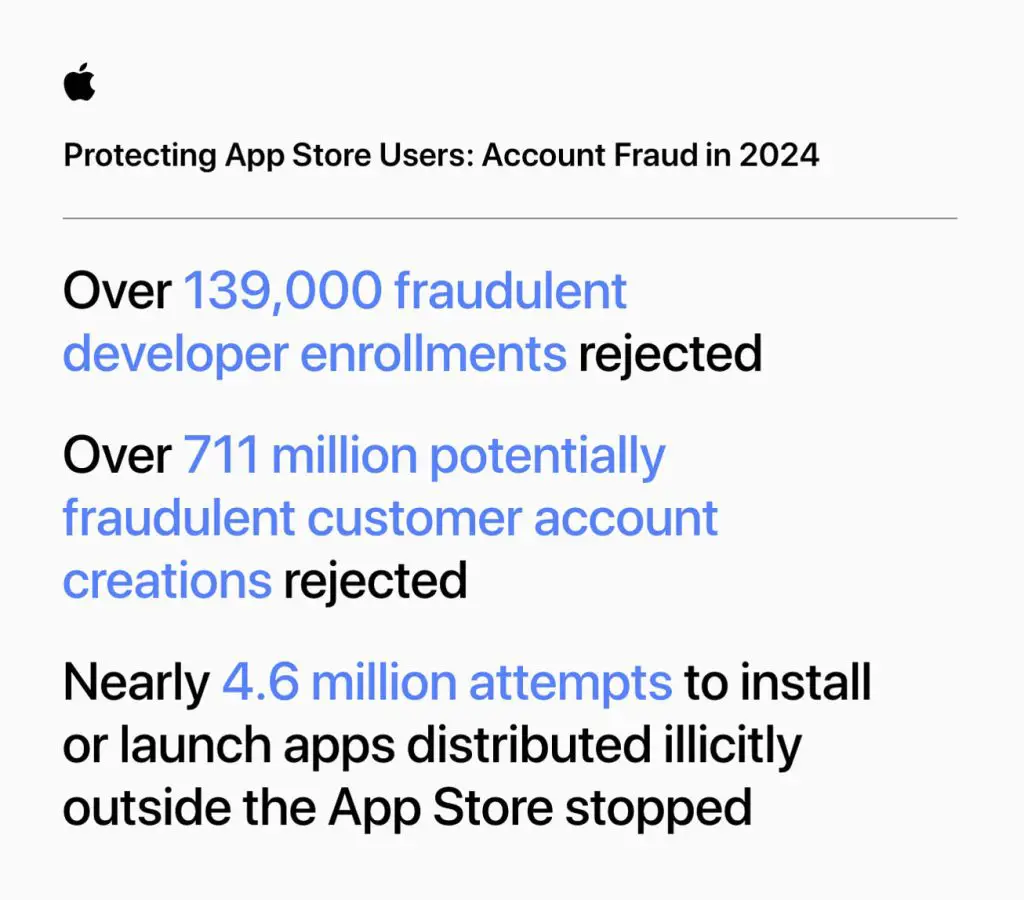
The App Store has long since evolved beyond a mere repository of applications — it is now a thriving ecosystem traversed by over 800 million users each week. Since its inception in 2008, the platform has transformed into a nexus of digital commerce and communication, which is precisely why Apple continues to devote unwavering attention to its integrity. In its annual report, the company revealed that in 2024 alone, it thwarted fraudulent transactions exceeding two billion dollars — a testament to just one facet of its ongoing vigilance.
Over the past five years, Apple has intercepted attempted fraud amounting to more than nine billion dollars. In the last year alone, the company identified and neutralized schemes aimed at financial and data theft at nearly every level — from the creation of fake developer accounts to the distribution of malicious apps and the circumvention of security checks. These reports not only highlight the vast scale of these threats but also the increasing technical sophistication of deceptive tactics.
One of the most vigorous lines of defense lies in combating fraudulent accounts. In 2024, Apple terminated over 146,000 developer accounts suspected of deceit and blocked more than 139,000 app submissions before potentially harmful software could be uploaded. Even more striking, however, is the rejection of over 711 million suspicious user account creation attempts, nearly 129 million of which were later deactivated.
These accounts serve a variety of malicious purposes — from disseminating spam to distorting app ratings and reviews, thereby undermining user trust and unfairly influencing search rankings. Such manipulation sabotages fair competition and fabricates a misleading sense of content popularity. This is precisely why Apple continues to prioritize its eradication.
Furthermore, Apple actively suppresses the proliferation of apps distributed through unofficial channels — so-called pirate storefronts — which host tampered, infected, or stolen versions of popular applications. In 2024, the company detected and shut down over 10,000 such rogue apps. These threats endanger not only users but also legitimate developers whose products are cloned, altered, and weaponized for malicious distribution.
In just the past month, Apple successfully blocked nearly 4.6 million installation attempts of counterfeit apps — whether attempted directly or via unauthorized marketplaces.
At the core of Apple’s security apparatus is the App Review system — a multilayered vetting process for every app prior to its release on the store. In 2024, the App Review team processed over 7.7 million submissions, rejecting more than 1.9 million. The reasons for denial vary widely.
Approximately 400,000 applications were rejected due to privacy violations involving personal data processing. Another 320,000 were declined for being spam, fraudulent, or intentionally misleading. Some developers attempted to embed hidden features triggered only after approval — in such cases, over 43,000 submissions were denied. The aim of these deceptions was clear: to bypass guidelines and gain unauthorized access to users’ devices.
Often, the discovery of a single malicious app leads to the unmasking of an entire network of interconnected threats from the same developer.
Apple also confronts efforts to manipulate internal App Store metrics. In 2024, the platform reviewed over 1.2 billion ratings and reviews, more than 143 million of which were deemed fake and removed.
Additionally, more than 7,400 apps were purged from App Store rankings, and nearly 9,500 were removed from search results — all in an effort to level the playing field for honest developers and cleanse the ecosystem of unscrupulous actors.
User financial security remains under heightened scrutiny. Over the past year, Apple prevented more than two billion dollars in payment fraud. The development team places great emphasis on Apple Pay security — every transaction is encrypted with a unique code and device-specific number, with no card data stored on the device or Apple’s servers. As a result, no sensitive information is shared with apps or third parties.
What else? Nearly 4.7 million stolen payment cards were detected, and over 1.6 million associated accounts were blocked. These feats were made possible by real-time validation systems and machine learning algorithms embedded in Apple’s infrastructure.
Developers, in turn, benefit from a secure framework encompassing Apple Pay and StoreKit. The latter enables seamless in-app purchases — whether for subscriptions or digital goods. Users can effortlessly manage purchases, request refunds, track transaction history, and cancel subscriptions — all safeguarded by encryption and Apple ID verification.
So, Apple enthusiasts can rest assured: the App Store remains a deeply fortified ecosystem, protected at every touchpoint — from the first registration to the final in-app interaction. The technologies and safeguards behind it continue to evolve, rising to meet ever-changing threats and preserving user trust across the globe.


